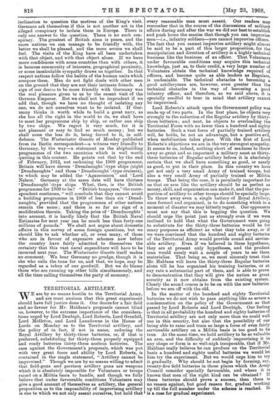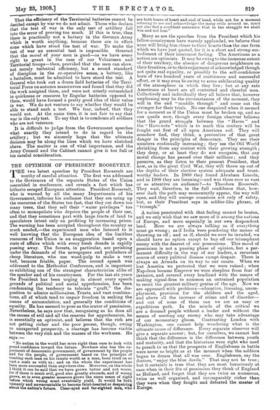TERRITORIAL ARTILLERY.
WE are by no means hostile to the Territorial Army, and are most anxious that this great experiment should have full justice done it. Our desire for a fair field and no favour for Mr. Haldane's proposals cannot blind us, however, to the extreme importance of the considera- tions urged by Lord Denbigh, Lord Roberts, Lord Grenfell, Lord Midleton, and Lord Lansdowne in the House of Lords on Monday as to the Territorial artillery, and the policy of in fact, if not in name, reducing the Royal Artillery by thirty-three batteries, or, if that is preferred, substituting for thirty-three properly equipped and ready batteries thirty-three nucleus batteries. The case against the Government's proposals, which was put with very great force and ability by Lord. Roberts, is contained in the single statement, " Artillery cannot be improvised." Though we are by no means willing to admit that field-guns and garrison artillery guns are weapons which it is absolutely impossible for Volunteers or troops raised on a Militia basis to handle, and though we fully believe that under favourable conditions Volunteers may give a good account of themselves as artillery, the general proposition as to the impossibility of improvising artillery is one to which we not only assent ourselves, but hold that every reasonable man must assent. Our readers may remember that in the course of the discussions of military affairs during and after the war we did our best to establish and push home the maxim that though you can improvise men—i.e., infantry soldiers—you cannot improvise officers. The fact that you cannot improvise artillery might almost be said to be a part of this larger proposition, for the manipulation and direction of artillery is a highly technical business like the business of an officer. That Volunteers under favourable conditions may acquire this technical knowledge, just as, to their credit, a very large number of Volunteers obtain the technical knowledge required of officers, and become quite as able leaders as Regulars, is undeniable. The technical obstacles to becoming a good artilleryman are, however, even greater than the technical obstacles in the way of becoming a good infantry officer, and therefore, as we said above, it is specially needful to bear in mind that artillery cannot be improvised.
Lord. Roberts's attack upon the Government policy was made up of two parts. In the first place, he objects very strongly to the reduction of the Regular artillery by thirty. three batteries ; and next, he objects to overloading the Territorial Force with no fewer than a hundred and eighty batteries. Such a vast force of partially trained artillery will, he holds, be not an advantage, but a positive evil, when mobilisation takes place. With the first of Lord. Roberts's objections we are in the very strongest sympathy. It seems to us, indeed, nothing short of madness to throw away so great and so important a military asset as thirty. three batteries of Regular artillery before it is absolutely certain that we shall have something as good, or nearly as good, to put in their place. In this country we have got not only a very small Army of trained troops, but also a very small Army of partially trained or Militia troops. That being the case, it is peculiarly important for us that an arm like the artillery should be as perfect as money, skill, and organisation can make it, and that the pro. portion of artillery to other troops should be specially large. To throw away even a single battery of Royal Artillery, once formed and organised, is to do something which in a moment of disaster we may bitterly regret. Our opponents must not say that this is begging the question. We should urge the point just as strongly even if we were, inclined to hold that what the Government were going to substitute for the thirty-three batteries would be for many purposes as efficient as what they take away, or if we were convinced. that the hundred and eighty batteries of the Territorial Army would provide sound and service- able artillery. Even if we believed in these hypotheses, they are at present only hypotheses, and the prudent man would surely wait a couple of years to see them materialise. That being so, we most sincerely trust that Mr. Haldane will leave the thirty-three Regular batteries alone till . he has organised his training batteries, or at any rate a substantial part of them, and is able to prove to demonstration that they will give the nation as great security as it now obtains from the existing system.. Clearly the sound course is to be on with the new batteries before we are off with the old.
In the matter of the hundred and eighty Territorial batteries we do not wish to pass anything like as severe a condemnation on the policy of the Government as that • passed by Lord Roberts and Lord Denbigh. Our feeling is that in all probability the hundred and eighty batteries of Territorial artillery are not only more than we could well use in this country, but also that the possibility of our being able to raise and train so large a force of even fairly serviceable artillery on a Militia basis is too good to be true. At the same time, we hold artillery to be so valuable an arm, and the difficulty of suddenly improvising it in any shape or form is so well-nigh insuperable, that if Mr. Haldane really believes he can produce on the Territorial basis a hundred and eighty useful batteries we would let him try the experiment. But we would urge him to try it gradually. Why should he not begin by forming, say, twenty-five field batteries in those places which the Army Council consider specially favourable, and where it is known that men of the right kind can be obtained ? If these batteries should prove a success, then there is no reason against, but good. reason for, gradual working up till the full number under the scheme is reached. It is a case for gradual experiment. That the efficiency of the Territorial batteries cannot be decided except by war we do not admit. Those who declare that the test of war is the only test of artillery fall into the error of proving too much. If this is true, then there is practically not a battery in the German Army which is worth anything, because there are in effect no which have stood the test of war. To make the twit of war an essential test is impossible. Granted that the moral of your men is good—as we have every right to grant in the case of our Volunteers and Territorial troops—then, provided that the men can show, not merely technical efficiency, but a sound standard of discipline in the co-operative sense, a battery, like a battalion, must be admitted to have stood the test. A General who took out a, dozen field batteries of the Terri- torial Force on autumn manoeuvres and found that they did the work assigned them, and were not utterly outmatched in quickness or resource by Regular batteries opposed to them, would have formed a pretty good idea of their value in war. We do not venture to say whether they would be able to stand such a test. We fear, indeed, that they would not. At the same time, it is not fair to say that war is the only test. To say that is to condemn all soldiers who are not veterans.
It is difficult to judge from the Government speeches what exactly they intend to do in regard to the artillery ; but we sincerely hope that the ultimate decision may be along the lines which we have sketched above. The matter is one of vital importance, and the Army Council and the Cabinet cannot give it too full or too careful consideration.







































 Previous page
Previous page